Best horses to run at Delaware Park are…
The victory by Juddmonte’s Idiomatic in the Breeder’s Cup Distaff by all intents and purposes locked up her claim to the Eclipse Award for Older Dirt Female in 2023. It gave her eight wins in nine starts this year, five straight and three in Grade 1 company.
Her victory in the Delaware Handicap helped kickstart her season, and subsequently the daughter of Curlin closed the year with three consecutive Grade 1 wins; she has a case for Horse of the Year. If so, she would have to be in the discussion if one were making a list of the most famous horses who have ever raced at historic Delaware Park. So let the discussion begin. In my mind here are the most legendary horses, listed in alphabetical order, that have raced at Delaware since 1960.
Afleet Alex
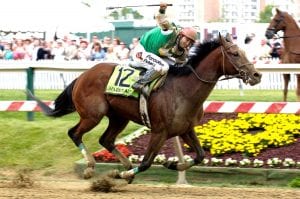
The first two races for this future champion took place at Delaware Park, where he broke his maiden and won an allowance in the summer of 2004. The rest of his career consisted of 10 stakes races, nine of which were graded. There were six stakes wins in those 10 races highlighted by victories in the Preakness and Belmont Stakes. Arguably a bad trip and a brutally fast pace were the only thing that led to his third-place finish in the Kentucky Derby, denying him a Triple Crown. Although he did not run again after his Belmont win, he was deservedly named the champion three-year-old in 2005.
Afleet Alex is one of those horses that gained fame even with non-racing fans, primarily through his owners (Cash is King LLC) partnering with the childhood cancer charity organization Alex’s Lemonade Stand Foundation. In addition, his Preakness win came after he nearly fell at the top of the stretch when Scrappy T veered into his path. The athleticism of the horse was showcased to a national audience on a day where racing still gets some attention outside of its core viewership.
Barbaro
When this future Kentucky Derby winner broke his maiden first time out at Delaware Park so little was known about him that track announcer John Curran pronounced his name incorrectly as “bar bear oh.” That was a turf race, but Barbaro would not ultimately remain a turf horse or an obscure one.
He won the Laurel Futurity on the turf to close out his two-year-old season and then the the Tropical Park Derby, also on the lawn, to kick off his three-year-old campaign. He then won the Holy Bull Stakes and the Florida Derby, both on the dirt. He then remained undefeated when he won the Kentucky Derby and stamped himself as a horse with a legitimate chance to win the Triple Crown.
Unfortunately, he broke down shortly after leaving the starting gate in the Preakness. Despite multiple operations the horse succumbed to laminitis in January of 2007. His courageous eight-month battle and the love from his owners who also bred the horse received more national attention than his racing career. His name and saga ultimately extended far outside the typical racing audience.
Buckpasser
One of the all-time greats, he competed in and won the 1966 Leonard Richards Stakes as a three-year-old in his only appearance at Delaware Park.
He did not compete in any of the Triple Crown events, but for his lifetime he finished in the money in 30 of his 31 starts with 25 wins. Among his victories were the Champagne, the Hopeful, the Jockey Club Gold Cup, the Woodward and the Travers.
He was the champion two-year-old colt of 1965, three-year-old colt of 1966, and older horse in both 1966 and 1967. Named horse of the year in 1966, he was elected to the Hall of Fame in 1970.
Damascus
In 1967 Buckpasser was champion older horse but did not repeat as horse of the year; that honor instead went to three-year-old Damascus. In addition to winning the Preakness and Belmont Stakes in that year he won nine additional major stakes. That list included the Jockey Club Gold Cup, the Wood Memorial, the Woodward, the Dwyer, the Travers Stakes and the Leonard Richards at Delaware Park. He won the Leonard Richards on June 17 that year and three weeks later went postward again at Delaware, this time finishing second in the William du Pont, Jr. Handicap.
For his career he finished in the money in all but one of his 32 career starts, winning 21 times.
CHECK OUT THE LATEST OFF TO THE RACES RADIO!
Havre De Grace
After finishing third in the 2010 Breeder’s Cup Ladies Classic, Havre De Grace won Horse of the Year in 2011 based on a fabulous season. For the year she won five of her seven starts, garnering wins in three Grade 1 races, including a win against the boys in the Woodward as well as victories over her own sex in the Apple Blossom and Beldame. Her only two defeats came in a Delaware Handicap thriller and then when fourth against the best males in the country the Breeders’ Cup Classic.
In the DelCap, Havre De Grace lost only by a nose to the excellent horse and her bitter rival Blind Luck, the prior year’s champion three-year-old filly. The race was so exciting that it was designated as “The Race of the Year” by the Daily Racing Form. The DelCap was the pair’s second meeting at Delaware Park; they had finished one-two the prior year in the Delaware Oaks, again with Blind Luck winning, again separated by a nose.
Kelso
The five-time Horse of the Year (1960 – 1964) Kelso won 39 of his 63 career starts with earnings of almost $2 million; adjusted for inflation, that’s equivalent to more than $17,000,000.
Kelso had a nondescript two-year-old season and did not run in any of the Triple Crown races, but his five-year run of excellence began as a three-year-old when he won eight of the nine races he entered highlighted, by his victory in the Jockey Club Gold Cup. He would go on to win that race in each of the next four years. He also was a three-time winner of both the Whitney and Woodward Stakes. Kelso was so versatile and talented that he also won the prestigious Washington, DC International in 1964 at 12 furlongs on the turf.
Although he only won a single stakes race at Delaware Park – the 1965 Diamond State Handicap — he spent significant time on the backstretch. His major Delaware area connection was that his owner (Allaire Du Pont) was a member of a family whose members helped shape the state. In fact William Du Pont founded and helped design Delaware Park.
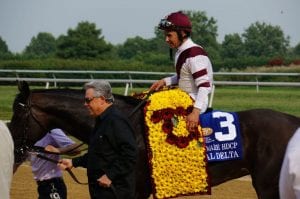
Royal Delta
One of only six horses to win back-to-back DelCaps, Royal Delta did so in 2012 and 2013. Consistency was a hallmark as she demonstrated by winning Eclipse Awards in 2011, as champion three-year-old filly, and in 2012 and 2013 as champion older mare. She was also a back-to-back winner of the Breeders Cup Ladies Classic in 2011 and 2012.
With all that winning, it is no surprise her career stats are ultra-impressive. In the money for 18 of her 22 starts and earnings exceeding $4.8 million dollars.
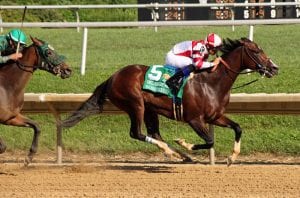
Songbird
As a two-year-old she won three consecutive Grade 1 races after breaking her maiden first time out. The last of those three graded wins was in the Breeder’s Cup Juvenile Fillies, locking up a divisional Eclipse.
She started her 3-year-old season with seven consecutive graded stakes wins before losing by a nose to the great Beholder in the Breeder’s Cup Ladies Classic but won the divisional Eclipse again.
Owned by Rick Porter of Wilmington, Delaware, she gave him his long-wanted win in the Delaware Handicap in 2017. Mr. Porter was fighting cancer at the time and had to get medical clearance to attend the race.
Songbird finished her career with 13 wins from 15 starts and never finished worse than second.
Spectacular Bid
The Bid was named champion two-year-old cold winning seven out of nine races in 1978. Oh, how the game has changed! Nine races as a two-year-old!
He won eight major stakes in 1979 including the Kentucky Derby and Preakness. He suffered his first defeat since Delaware’s Dover Stakes in August ’78 in the Belmont, a defeat many blamed on the inexperienced jockey or that the horse had stepped on a pin prior to the race. His first start following the Belmont disappointment was an allowance race at Delaware Park, which he won en route to being named as three-year-old champion.
He won all nine races as a four-year-old and was so formidable that his final start, in the Grade 1 Woodward, ended up being a walkover. Spectacular Bid was named Horse of the Year for his work, and trainer Bud Delp called him “the greatest horse to ever look through a bridle.”
Of course, your mileage may vary. What are your top choices?
LATEST NEWS



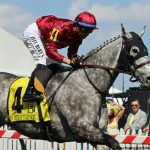
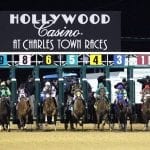
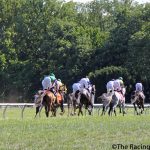

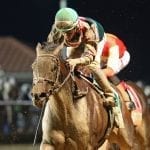
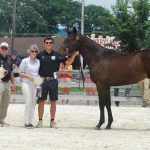






Great read Mike.
Thanks for the walk down memory lane